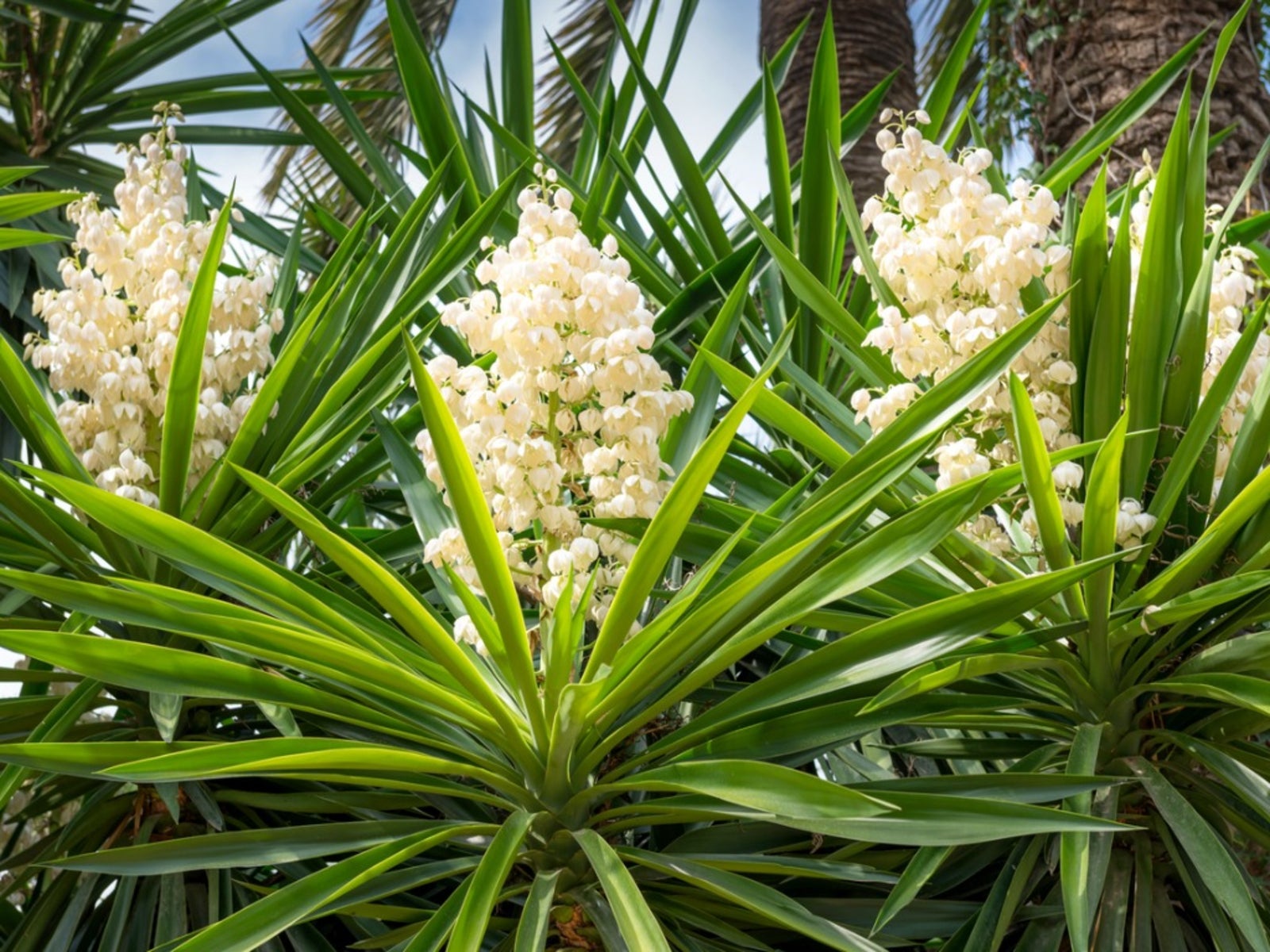Yucca rostrata is just as unique as its name. Native to Western Texas and Northern Mexico, this tree-like yucca is an ornamental and slow-growing evergreen, perfect as a xeriscaping plant. Known to be one of the toughest trunk-forming yuccas, Yucca rostrata is drought-tolerant and a popular garden attraction in the UK, US, and Canada.
The plants form a dramatic, shimmering rosette over the tree trunk in your garden. Covered with pale gray fibers of old leaves, the rosette displays a silvery haze. Yuccas can reach grow up to 15′ feet tall and are an excellent candidate for rocky slopes, canyon bottoms, and ridges.
The beaked yucca (Yucca rostrata) is a stunning architectural plant ideal for xeriscapes and rock gardens. However, these hardy plants aren’t immune to pests like scales that can ruin their appearance. Learn how to banish scales from your beaked yucca for good.
What are Scales?
Scales are small sap-sucking insects that attach themselves to stems, leaves, and roots of plants. On beaked yucca, they look like tiny bumps or swollen areas on the foliage. Scales pierce the plant tissues and feed on the sap, weakening the plant.
There are two main types of scales
- Soft scales secrete a cottony or waxy substance that covers their bodies. They don’t move much once attached to the plant.
- Armored scales produce a hard protective covering over themselves, making them difficult to penetrate with insecticides.
Left uncontrolled, scales produce honeydew that leads to fungal growth like black sooty mold. Heavy infestations can even kill the plant.
Signs of a Scale Infestation
Watch for these signs to catch scale invasions early:
- Small bumps or swollen areas on leaves, stems, or roots
- Sticky honeydew on foliage
- Sooty mold growing on leaves
- Yellowing or browning of leaves
- Stunted plant growth
Check undersides of leaves and stems thoroughly, as scales like to hide in protected areas Their flattened bodies allow them to blend right in to plant surfaces
Natural Remedies to Control Scales
For light infestations, try these non-toxic home treatments first:
Insecticidal Soaps
Insecticidal soaps dissolve the waxy coating on soft scales, causing dehydration and death. Spray thoroughly, especially leaf undersides. Repeat every 5-7 days until scales are gone.
Neem Oil
The azadirachtin in neem oil acts as an insect growth regulator. It prevents scale larvae from maturing and disrupts the molting process.
Horticultural Oils
These oils smother scales by sealing off their breathing pores Coat all plant surfaces for best results
Alcohol
Wipe scales off with a cotton swab dipped in 70% isopropyl alcohol or soapy water. Be careful not to damage plant tissues.
Manual Removal
For light infestations, rub scales off gently with your fingers or an old toothbrush. Crush them to ensure they’re dead.
Chemical Treatments for Heavy Infestations
If natural remedies don’t eliminate serious scale problems, you may need chemical control. Use pesticides as a last resort, carefully following all label precautions:
- Systemic insecticides are absorbed by plants, killing scales who feed on the sap. However, they also kill beneficial insects.
- Horticultural oils suffocate scales. Use a dormant oil spray when plants are inactive in winter.
- Insect growth regulators disrupt the scales’ life cycle so they can’t mature and reproduce.
- Organophosphates are older chemicals that work by overstimulating the nervous system of insects.
Rotate chemical classes to prevent resistance. It often takes multiple treatments to disrupt the scale life cycle across 2-3 generations.
Preventing Future Infestations
Good cultural practices are key to preventing scale problems:
- Inspect plants regularly – catch invasions early before they get out of hand
- Use a pressurized water spray to dislodge scales
- Avoid excess fertilization – lush growth attracts sucking insects
- Prune for good airflow – thin growth stops mold issues
- Quarantine new plants before introducing to your landscape
- Support natural predators like ladybugs and lacewings
With diligence and integrated pest management, you can keep scales off your prized beaked yuccas for good. Reach out to your local extension office for customized scale prevention and treatment recommendations in your area.

All About Yucca Rostrata
Yucca rostrata, known commonly as beaked yucca or Big Bend yucca is a trunk-forming yucca that is native to the Big Bend region of West Texas, Chihuahua and Coahuila, where it grows in desert conditions, where sandy soil and distinct daytime and nighttime temperatures reign.
Hailing from the family of Asparagaceae, Beaked Yucca is extremely tolerant to heat, drought, and frost. It can withstand temperatures as low as -10° degrees Fahrenheit. It offers a striking focal point in gravel gardens, Mediterranean gardens, and borders.
Yucca rostrata has sharp-tipped, bluish-green leaves that sprout from the trunk, resembling a symmetrical pom-pom. It produces yellow-orange flower stalks in late spring that bears beautiful clusters of white flowers. They can easily thrive on neglect with full sun and well-drained soil.
The plant is naturlized and adapted to other regions, including New Mexico, Utah, and Colorado. These yuccas grow there up to 15 feet tall, and attract hummingbirds and yucca moths while in bloom.
The COMPLETE Guide to Getting Rid of Scale Insects
FAQ
What are the scales on my yucca plant?
How do you permanently get rid of scale on plants?
How to care for a beaked yucca?
What is the best insecticide for scale?
